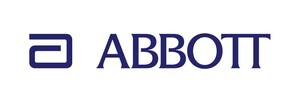
- Liberta RC™ deep brain stimulation (DBS) system, recently approved by the U.S. FDA, features NeuroSphere™ Virtual Clinic, which allows for remote programming of the system
- System offers the longest time between charges of any DBS technology on the market, allowing people with movement disorders to recharge the device only 10 times a year2*
ABBOTT PARK, Ill., Jan. 25, 2024 /PRNewswire/ -- Abbott (NYSE: ABT) announced today that it received approval from the U.S. Food and Drug Administration (FDA) to launch the Liberta RC™ DBS system, the world's smallest rechargeable deep brain stimulation (DBS) device with remote programming, to treat people living with movement disorders.1+ The Liberta RC DBS system also requires the fewest recharges of any FDA-approved DBS system, needing only 10 recharge sessions a year for most people.2*
Communication between people and their doctors is critical to ensuring exceptional care, especially for those who suffer from chronic conditions, such as Parkinson's disease and essential tremor, that can be treated with deep brain stimulation therapy. The Liberta RC DBS system is the only rechargeable DBS device compatible with Abbott's proprietary NeuroSphere™ Virtual Clinic, a first-of-its-kind connected care technology in the U.S. that allows people to communicate with their doctors, ensure proper settings and functionality, and receive new treatment settings remotely as needed without stepping foot in a doctor's office.^ Abbott developed NeuroSphere Virtual Clinic after research showed that the average Abbott DBS user in the U.S. must travel more than 150 miles to access a movement disorder specialist.3
"When our patients choose a rechargeable DBS system, it is often based on the smaller size of the device, but the tradeoff has always been how recharge frequency affects their lifestyle," said Dr. Paul Larson, professor of neurosurgery at the University of Arizona. "The Liberta RC DBS system excels in both areas, as a compact rechargeable device with the lowest recharge requirement of any FDA-approved DBS system. This achievement, coupled with the integration of remote programming capabilities, is a significant advancement for patients."
At approximately the height and width of a smartwatch face, the Liberta RC DBS system is about 31% smaller than other commonly used implantable, rechargeable DBS devices currently available in the U.S.4** When used under standard settings, Abbott's Liberta RC DBS system needs to be recharged as few as every 37 days – or 10 times a year – using a wireless charger that is placed over the device.5 For users who prefer a weekly charging schedule, only 30 minutes of charging is needed.5 The wireless charging system allows people to be active while wearing it and can fully recharge the Liberta RC DBS system twice before needing to be plugged in again.6 The system, which can be controlled on an Abbott supplied patient controller or a compatible and secure iOS device***, offers users helpful notifications and customizable settings for a personalized charging experience.
"In developing the Liberta RC DBS system, our focus has been on the unique experiences of individuals with chronic conditions like movement disorders," said Pedro Malha, vice president, neuromodulation, Abbott. "At Abbott, we're committed to addressing these diverse needs. This system exemplifies our drive to providing patient-first solutions, combining effective therapy, effortless recharging, and remote programming capabilities."
For U.S. important safety information on the Abbott Liberta RC DBS neurostimulation system, visit: https://bit.ly/DBSISI
+Based off comparison to volumetric measurements, including the following IPGs: Abbott Liberta RC DBS System: 13.79 cc, SceneRay Aaxon RNDǂ: 24 cc, and PINS G102Rǂ: 31.5 cc.
*Upon implant of the Liberta RC DBS System, 37 days of therapy when programmed with standard (nominal) stimulation settings as described in device Instructions for Use (IFU). Recommended recharge frequency and duration for competitor rechargeable DBS systems described in their respective IFU or clinical studies, which may involve different patient populations and other variables. Not a head-to-head comparison of stimulation settings or clinical outcomes.
^Anywhere with a cellular or Wi-Fi connection and sufficiently charged patient controller and neurostimulation device.
**Calculated by comparing the Liberta RC DBS System vs. the Boston Scientific Vercise‡ Genus R16 based on volumetric measurements (13.79cc for Liberta RC DBS System and 20.1cc for Boston Scientific Vercise‡ Genus).
***Available on eligible smart mobile digital devices. For a list of personal smart mobile digital devices compatible with Abbott's patient controller app, visit http://www.NMmobiledevicesync.com/dbs.
About Abbott
Abbott is a global healthcare leader that helps people live more fully at all stages of life. Our portfolio of life-changing technologies spans the spectrum of healthcare, with leading businesses and products in diagnostics, medical devices, nutritionals and branded generic medicines. Our 114,000 colleagues serve people in more than 160 countries.
Connect with us at www.abbott.com and on LinkedIn, Facebook, Instagram, X and YouTube.
1 Abbott. Liberta RC™ DBS System Remote Programming Comparison Claims Memo. Plano, TX. 2024.
2 Abbott. Liberta RC™ DBS System Recharging Comparison Claims Memo. Plano, TX. 2024.
3 Abbott. DBS Patient Travel Memo. MAT-2100238 V1.0.
4 Abbott. Liberta RC™ DBS System Size Comparison Claims Memo. Plano, TX. 2024.
5 Abbott. Liberta RC™ Deep Brain Stimulation Implantable Pulse Generator Clinician's Manual. Plano, TX. 2023.
6 Abbott. Jupiter Software Formula Specification. Plano, TX. 2023.
SOURCE Abbott







Share this article